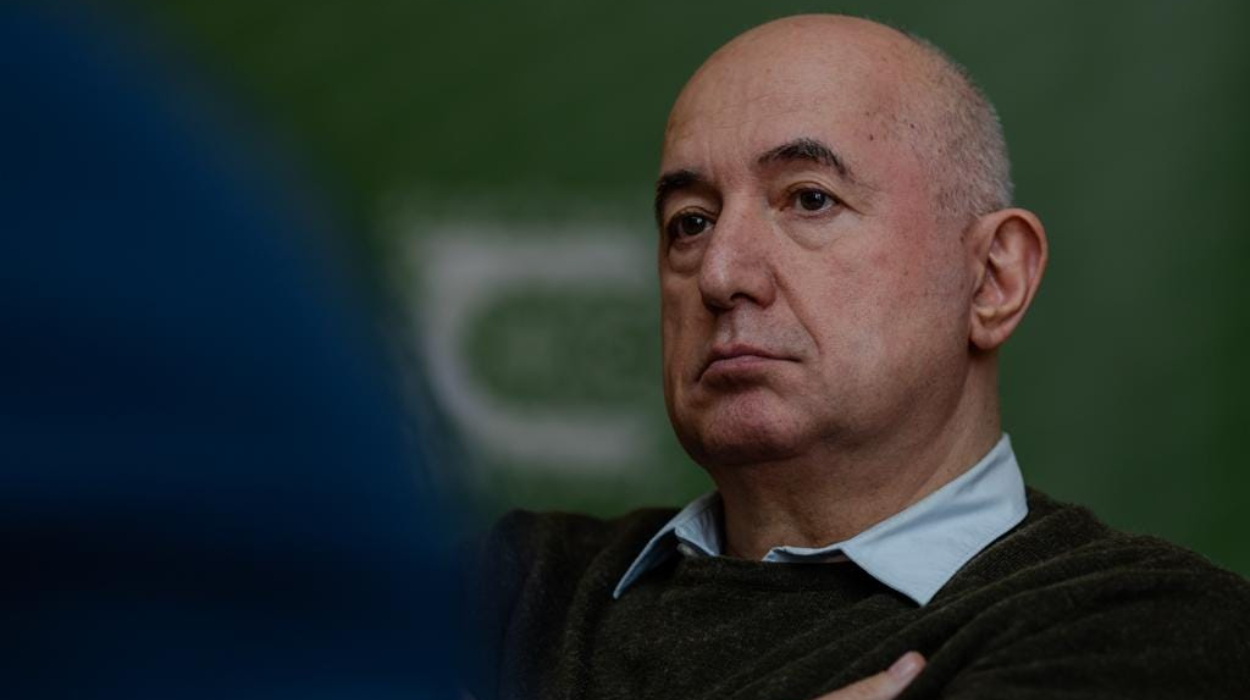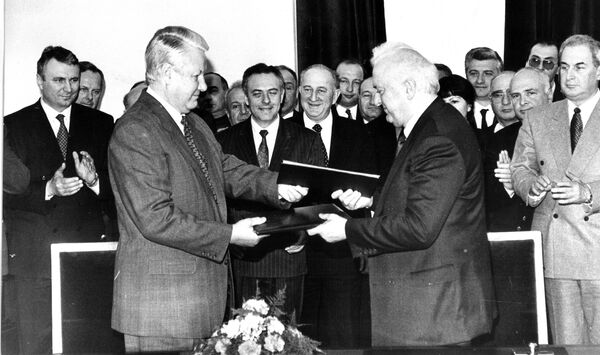Paata Zakareishvili's Parallel Realities: Georgia's 'Non-Use of Force' Facade

Paata Zakareishvili, Former State Minister for Reconciliation and Civic Equality from 2012 until 2016.
JamNews recently posted a segment from an interview with Paata Zakareishvili on X (Twitter). In this segment, Zakareishvili elaborates on the non-use of force agreement, stating:
"For years Abkhazians have been asking Georgia to sign an agreement with them on non-use of force. We responded that Russian troops are there. What logic is there to sign an agreement with Abkhazians on non-use of force, on non-resumption of war when Russian tanks are there? Can Abkhazia stop them? No. It has no tanks at all.
But if the Russians leave and the European Union comes in – the Georgian side would undertake to sign such an agreement in an expedited manner with both the Abkhazian and Ossetian sides."
In response to Mr. Zakareishvili's remarks, it is imperative to delve deeper into the complexities and implications of his statements. Let's examine the underlying assumptions and contrast them with historical and current geopolitical realities.
Firstly, how can Abkhazia consider the EU as a guarantor when the EU views both Abkhazia and South Ossetia as integral parts of Georgia??
Regrettably, international institutions have not maintained a neutral stance in the Georgian-Abkhazian and South Ossetian conflicts. This bias undermines their potential role as impartial guarantors. In this context, the signing of a non-use-of-force agreement holds symbolic significance beyond its practical implications. Such an agreement could serve as a substantial measure for building trust and confidence.
Secondly, Mr. Paata asserts that the Abkhazia would not intervene if Russian tanks were to advance towards Georgia, with his words: “Can Abkhazia stop them? No. It has no tanks at all.” Quite an observation, Mr. Zakareishvili. Given this laughable stance, will the absence of the Georgian-Abkhazian non use of force agreement protect the Georgian side? What's the point??
Furthermore, why should we become entangled in a conflict with Russia to defend Georgia? What rationale lies behind expecting the Abkhazians to make sacrifices for Georgia? Ok, let's assume that Abkhazia has no tanks. Does Mr. Paata's country lack tanks as well? Even Ukraine, inundated with NATO weapons, couldn't halt Russia, yet Mr. Paata expects Abkhazia to stop Russian tanks — and for the sake of Georgia, no less…! Also, after Russia's tanks conveniently exited Abkhazia, is Mr. Paata willing to vouch that Georgian tanks won’t eagerly step in? Any assurances to offer there? And when the Georgian tanks approached the Ingur border, were Mr. Paata and his fellows seriously prepared to intercept them, or was that just wishful thinking? It seems Mr. Paata is living in a parallel universe.
We must remember, it was a combined effort of Georgia and Russia that sparked the war against us. Shevardnadze and Yeltsin’s meeting in Sochi was decisive. And, immediately following the war, both Russia and Georgia imposed an embargo on Abkhazia. It wasn't us who engaged in a treaty of friendship and good neighbourliness with Russia during that period, it was Georgia…

Russian President Boris Yeltsin and Georgian President Eduard Shevardnadze after signing the Treaty of Russian-Georgian Friendship, Good Neighborliness, and Cooperation. Behind Andrei Kozyrev and Jaba Ioseliani (February 3, 1994).
After the 1992-93 war, Georgia made three attempts to assert control over Abkhazia and two over South Ossetia using military force. Given that Georgia initiated the war (1991-92 and 1992-93) and subsequently did not hesitate to use force, it raises the question: Why should we trust Georgia? Why?
The 1994 Moscow Accords, which officially established a ceasefire in the Georgian-Abkhazian war, delineated a demilitarised zone. However, in the spring of 2006, Saakashvili introduced an armed unit into the Kodor Valley, misleadingly labeling it a "police force." See: https://rferl.org/a/1070114.html and https://rferl.org/a/1070254.html
Christopher Langton: “Only if you're pointing your finger at the West, and its assistance to Georgia and the fact that Georgia abused that friendship by using weapons and equipment given to them for illegal purposes.”
Moreover, the formal agreement to prevent a resumption of hostilities, which the Abkhazians and Ossetians continue to advocate for in the ongoing Geneva talks, has become increasingly important following the August 2008 war. This conflict was sparked by a Georgian artillery attack on residential areas in Tskhinval, occurring mere hours after President Saakashvili had declared a unilateral ceasefire.
Lastly, perhaps Mr. Paata is either overlooking or deliberately ignoring a critical fact: His country started and subsequently LOST THE WAR. Is there any precedent in history where a country that lost a war it started sets terms for the victorious party? So, Georgia is NOT in a position to dictate terms to Abkhazia, particularly under such absurd conditions.
Yes, a critical aspect to consider is the extensive influence of Russia on Abkhazia, which indeed is significant. However, this is a consequence of the international isolation imposed on Abkhazia, prompted by Georgia. Had there been recognition and cooperation from the international community, had economic engagements with the wider world not been hindered, Abkhazia would not find itself reliant on Russian support to such a degree. This reliance on Russia, both militarily and economically, stems not from a state of control, but from a lack of viable alternatives due to Abkhazia's isolated position. Furthermore, the presence of Russian activities within Abkhazia is the result of deliberate and negotiated bilateral agreements between the two countries, reflecting a partnership rather than an imposition.
If one wants to go on complaining about Russian influence in Abkhazia, they had better engage with Abkhazia to open another door to integrate it with the rest of the world. This does not necessarily entail recognition of their independence but a policy of ‘engagement without recognition’. Otherwise, the Abkhazians and Ossetians will continue having to rely mainly on Russia and its military strength as the main factor in their stability and security.
These are the realities Mr. Paata is faced with. One can only hope that Mr. Paata's forthcoming pronouncements might actually grapple with these realities. If not, he seems perfectly poised to waltz through another three decades in his bespoke parallel world, guided by the same old tune.